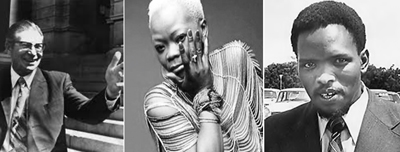|
 |
What did Hendrik Verwoerd and Steve Biko have in common? Or perhaps Johannes Kerkorrel and Brenda Fassie?
“They all possessed a certain natural predisposition to prominence,” says Prof Paul Fouche, reseacher in psychobiography at the University of the Free State’s Department of Psychology.
Prof Fouche and a team of researchers from other South African universities released findings on psychobiographical studies done on personalities that played a great role in our history.
The studies show that notable historical figures were very often prolific readers with a passion for literature since childhood. Generally, they also had a great love for nature and a sense of the sacredness of it, as well as a love for the cosmos.
The study further reveals that many of them were forced to take up leadership roles in the family from a very young age and were driven to succeed in order to take care of their own.
In many of these cases, there was a strong partner who supported the leader while they went about the business of governing their world.
Psychobiography is the systematic and descriptively-rich case study of renowned, enigmatic or even contentious individuals in socio-historical contexts within a psychological frame of reference. Over the past decade, psychobiography has become an established research genre and a methodology used by various academics and scholars in the field of life history research.